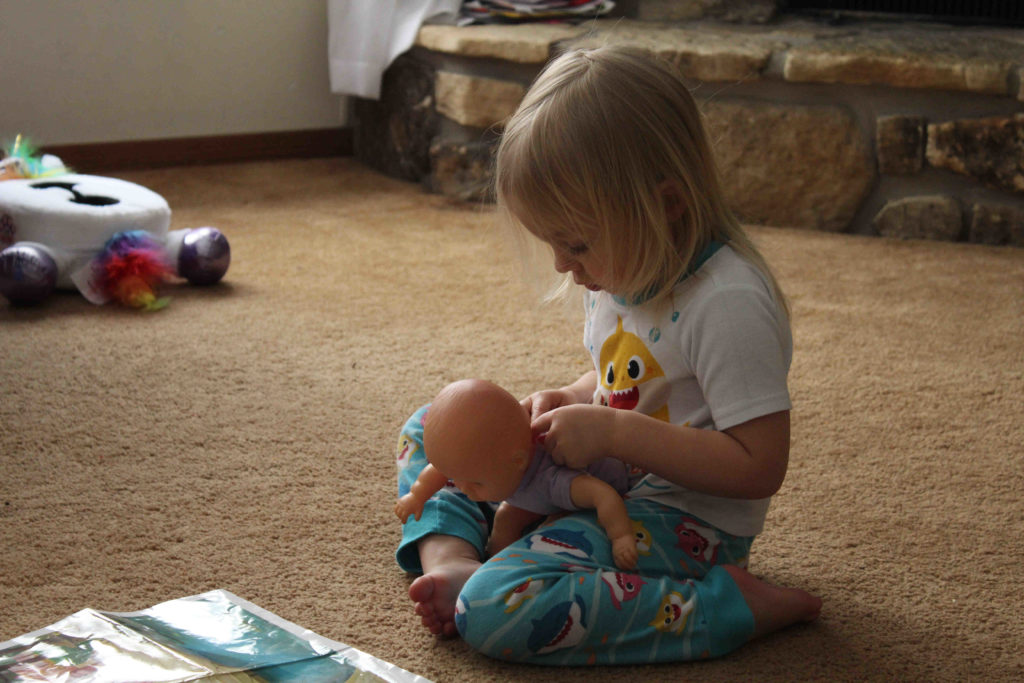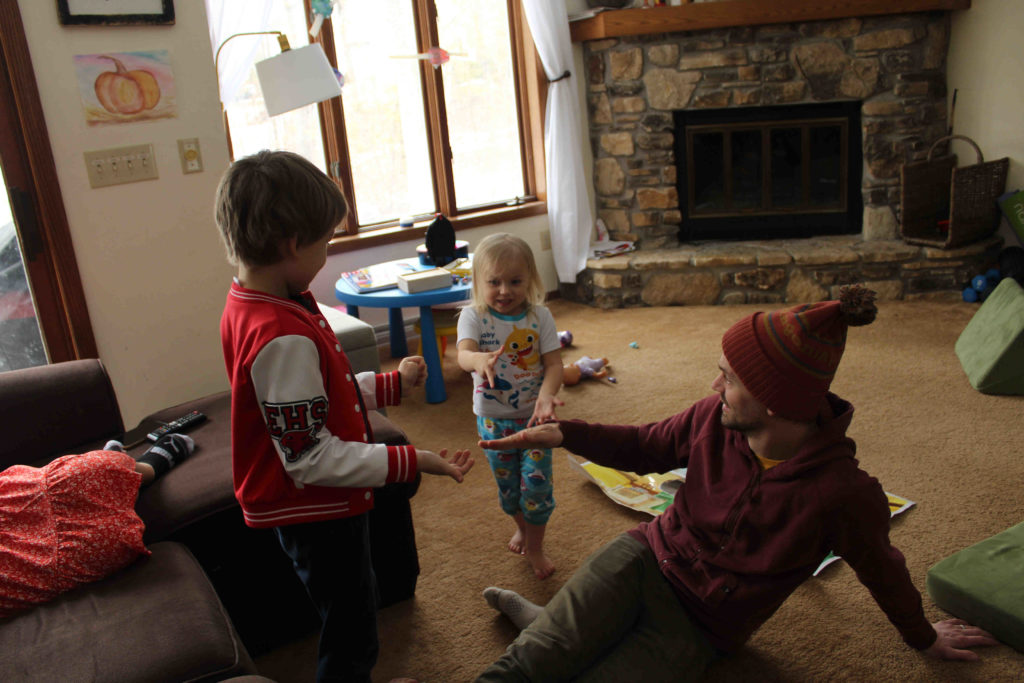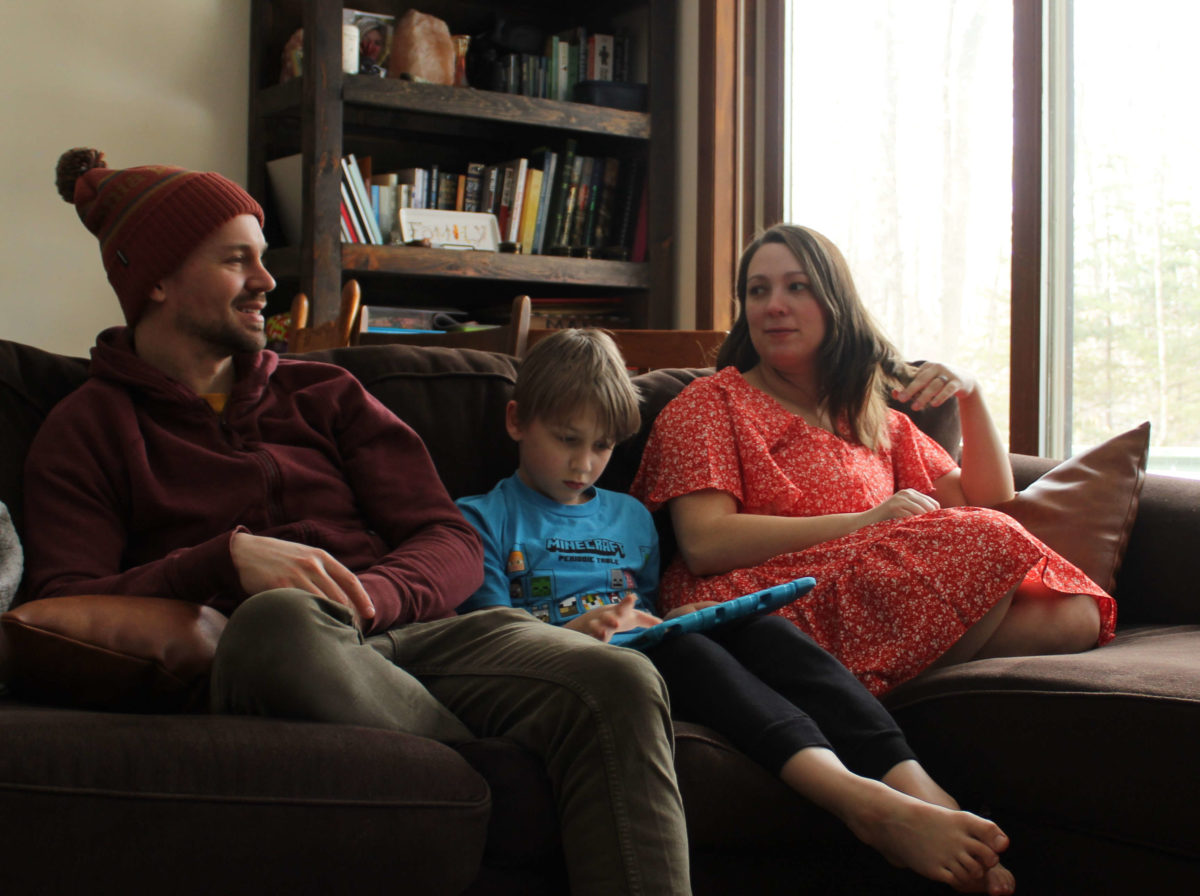It is a spring afternoon in Sister Bay and Salem, Riley, and Basil Duebler, ages 7, 6, and 3 respectively, make a fort out of cushions to climb over and roll down. Their parents, Abby and Ryan, watch on as the kids tumble across the living room.
A recording of the musical “Hamilton” is playing on the TV. The kids each pause their play and become fixated on the show when their favorite numbers are performed.
A computer with multiple monitors sits on the corner of the dining room counter – an originally temporary fixture that in the past year has become permanent.
“It’s a benefit to me having Ryan work from home,” Abby said. “He is able to stand up and get grapes for Basil, instead of me having to stand up and do two other things. It’s still nice having an extra pair of hands even though he is still working full-time.”
With Ryan working from home, the Dueblers have been able to tackle their childcare needs together instead of taking shifts due to competing schedules. This was not always the case. For the Dueblers, like hundreds of families in Door County, finding proper and affordable child care can be a long lasting challenge.
Child care town halls
United Way of Door County last fall started hosting town hall events to gather information about the community’s child care needs. That event series will culminate tonight from 6:30 to 8:00 pm in a town hall meeting with state Sen. Andre Jacque, state Rep. Joel Kitchens, and a member of U.S. Rep. Mike Gallagher’s staff.
Door County parents face challenges including limited options for child care and limited space available at existing facilities; logistical and scheduling issues arising from the county’s tourism industry and unique geography; and the cost of child care itself. Child care providers also face difficulties in building a sustainable business model while meeting regulatory standards.
United Way town hall with legislators
Tuesday, May 25, 6:30 – 8 p.m. on Zoom
Attending: State Sen. Andre Jacque, state Rep. Joel Kitchens, and a member of U.S. Rep. Mike Gallagher’s staff.
To attend or ask a question: Contact Christina Studebaker at [email protected] or 920-746-9645.
The town halls helped United Way dive into the complexity of the issue, said Christina Studebaker, a United Way community impact coordinator.
“We had growing waiting lists at the Barker (Child Development) Center and specifically Northern Door (Children’s Center) up at Sister Bay,” Studebaker said. “At that time the Barker Center had a waiting list as long as its enrollment list. They had about 90 kids enrolled, but they had 90 families on a waiting list, and Northern Door had a waiting list for the first time in many years, and it was growing, and then the pandemic came along and turned everything upside down.”
Studebaker said the Barker Center’s closure, as well as other issues tied to the pandemic such as an expected Covid baby boom, have added to the difficulties Door County families have been experiencing.
“It became two tracks,” Studebaker said. “Navigate your way through Covid, but also know that once we get through Covid, what are the community needs for the future?”
All of the United Way meetings have been archived on the United Way’s Youtube channel.
Limited options available

There are three licensed child care facilities in Door County: the Northern Door Children’s Center, the Door Community Child Development Center (formerly the Barker Center) in Sturgeon Bay, and a third facility in Brussels called Adventures. (Disclosure: Knock reporter Logan Thomas’s mother, Lizz, and brother Devin are board members at the Northern Door Children’s Center.)
Across those centers they are able to accommodate about 200 to 225 children under age five, Studebaker said.
Door County has more than 1,000 residents five years old or younger, according to Census data. Some of the older children in this range are enrolled in 4K and kindergarten, but this leaves about 750 children outside of these public school programs with only 200 to 225 slots in licensed child care centers to accommodate these kids, Studebaker said.
Another option, Studebaker said, is home-based care. There are only two certified home-based providers in Door County. This means that due to regulations on how many children can be cared for at a time by a staff member, the home-based providers can only accommodate about 20 children.
Some of Door County’s young children may be cared for by their parents and relatives, as well as trusted caregivers, but Studebaker said United Way still feels some of these children may not have adequate care.
“We still have hundreds of kids that are somehow being cared for, we just don’t know and I don’t like that we don’t know,” she said. “I think that adds to parents’ anxiety. What are my options if I think my kid is not being taken care of the way that I would like? And then affordability? All of those things. We have hundreds of kids that we wonder, ‘Could those things be improved?’”
The Dueblers have utilized their family members for their childcare needs.
“One thing that a lot of families rely on is their families, grandparents and things,” Abby said. “During the pandemic both my sister and my father have moved up here, which has been nice because if we needed a sitter we’d have one.”
Scheduling and logistics

The primary issues with childcare in any community come down to a few different factors, Studebaker said. One factor is whether families have access to a nearby center that operates during the hours that the care is needed – an issue the Dueblers faced as well.
“Something else that we did to avoid having to get child care was to work opposite schedules,” Ryan said. “So I worked mornings and days, and Abby worked nights for quite a while.”
“And when we did that we did manage to have days off together, but we didn’t really get to see each other other than our scheduled days off,” Abby said. “One of the big reasons Ryan switched from a restaurant job to a full-time day job was to give me more flexibility with employment.”
For families with parents who work nights and weekends, finding child care that fits their needs can be challenging.
“So when you have got workers that work the second shift,” Studebaker said, “you’ve got hospitality and restaurant workers that have different sorts of hours. Manufacturing might have a second shift. Weekends. Is the care that I need available and for the age that I need?”
There are also both seasonal and geographical challenges that are specific to Door County.
“You’ve got people where their schedules change throughout the year,” Studebaker said. “And you might be able to accommodate something in the winter months but in the summer months your needs are very different. Many of the licensed facilities, even if you’re working through a home-based provider, operate off of having the same sort of offering all the time. So there’s really no flexibility, which our community would benefit from being able to have a certain type of care during a certain part of the year.”
There also are logistical challenges with living on a peninsula. Where residents of other counties may have neighboring counties to source for alternative care, Door County does not, Studebaker said.
In other counties in the state it would be more simple to source child care from neighboring communities, but due to the unique landscape of the Door Peninsula that becomes an impossibility for many families. What could be a five or ten minute commute to reach another county in other Wisconsin communities can be an extra 30 minutes on a commute on Highway 57 or 42 in Door County. This can add to the strain and anxiety for Door County families, Studebaker said.
Challenges for providers
The Barker Center was closed last year in part because of the challenges that child care centers face.
The Barker Center had been run by the Door County YMCA. Once the pandemic closed many of its operations, the YMCA’s membership and revenue declined, Studebaker said, resulting in cost cutting and, subsequently, the closure of the Barker Center.
The YMCA announced in July 2020 that it would no longer continue operation of the center, citing lack of funding to offset the minimum projected losses and financial losses due to free all day 4K programs through the public school system.
A few weeks after the YMCA closed the Barker Child Development Center, its former director, Alexis Fuller, said she would reopen the center, without YMCA affiliation, as the Door Community Child Development Center.
Studebaker said it is not just a matter of more centers, but rather the placement of those centers, and whether they can directly address community needs and create a business that can sustain itself.
“You have to have enough kids enrolled to make your budget work,” she said, “which we figure is somewhere between 80 and 100 kids to have a really good financially stable center.”
“We need to keep the pressure on the government to say, ‘You have to do your part.’”
Christina Studebaker, United Way community impact coordinator
Studebaker said in order to address these issues, the Door County community needs advocacy paired with community support.
“We need to keep the pressure on the government to say, ‘You have to do your part,’” she continued, “We need help just like the schools need subsidies and support for what they do – you can think of childcare just as education that goes down to birth. That’s really when it starts. Kids are born learning. Part of what is so important with this system is that it’s not just physical safety, it’s that the kids are learning. The question is, ‘What are they learning?’ and, ‘what do we want them to be learning?’”
The age of the child receiving the care also is a factor in finding an available child care center or facility. For licensed child care for children under two years old, there must be one child care provider for every four children. This increases to one provider for every 12 children once they are 4 or 5 years old, Studebaker said.
This causes there to be a limited amount of spaces for infants that a child care center can provide. In an instance where there is a baby boom, this can cause complications for a child care center that would need to provide care for an inordinately large amount of children in one year, Studebaker said.
Studebaker said staffing also is an overlooked issue.
“If you don’t have people that can provide the care, that other stuff doesn’t matter,” Studebaker said. “It’s a struggle locally for us to find people to come up to Door County.”
Although the average wage for a childcare provider in Door County is higher than the state average, about $12 to $16 per hour in Door County where the Wisconsin average is somewhere from $10 to $12 per hour, the availability of housing and general higher cost of living in Door County cause difficulties in attracting child care workers, Studebaker said.
“We want our kids cared for by people, not screens,” Studebaker said. “We want them to be taught by people who know what to do in terms of health and education – mental health, physical health, all those things. So when you take all of that into account, at least in Wisconsin, it’s typical for 80 percent of an organization’s budget to go to salary and benefits.”
Affordability

The cost of childcare also can be a challenge for many families in Door County.
“When Ryan and I were working together full-time we were both getting paid a fair amount for our work and we really enjoyed the jobs we were doing,” Abby said. “(But) because we had to pay our sitter as much as we did, by payday I was only seeing a very small amount in my paycheck that was only going to us and not the sitter.”
At Northern Door Children’s Center and the Door Community Child Development Center tuition ranges from $205 to $240 per week. This is consistent with childcare costs throughout Wisconsin and equates to between $10,000 to $12,000 per year. This cost is comparable to in-state tuition at the University of Wisconsin, Studebaker said.
One way that families can address these costs is the Wisconsin Shares Child Care Subsidy Program. This program supports families in need by providing funding for a portion of their child care costs while the parents are working or participating in an approved activity.
There are families that use this program enrolled at both the Door Community Childcare Development Center and the Northern Door Children’s Center, but some families may be unaware that they qualify for the program, Studebaker said. There are also opportunities for home-based providers to become licensed and receive funding for this program to stabilize their business.
Studebaker acknowledged that these issues are not new for families in Door County.
“People have gotten by with childcare the way it exists, but that doesn’t mean it’s operating very well and that we shouldn’t pay attention to it,” Studebaker said. “I think there’s a lot of background anxiety that people are dealing with.”

